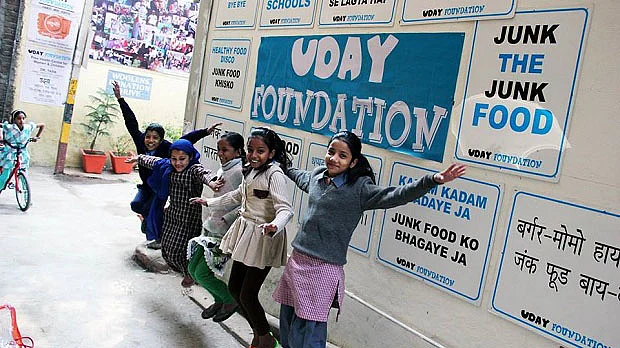Schools today run on a pretty conventional schedule. While mathematics and games periods rule the roost in terms of duration, recess gets an average of 20 minutes a day. This is a very crucial period as a child, sapped of energy on a normal school day, can rejuvenate himself with an intake of healthy, nutritious food. It allows the tired child a break from his studies, giving him time to play around with his friends. Most importantly, however, it helps to teach the child proper eating habits. I can still remember a time when I was in school and we would have to show our empty tiffin boxes to the teacher, in order to be allowed to go and play.
It was the autumn of 2010. I was visiting a dear friend who is an endocrinologist in a premium medical institute in Delhi––we would often get together to talk about our mutual interests in working for children with medical needs. More often than not, therefore, our discussions would revolve around different kinds of illnesses, ways to arrange medicines for a child and various related issues. He was particularly annoyed that day as he told me of a visit he had had from a woman and her daughter––the daughter was overweight due to hypertension and was being treated for acidity and indigestion at a private clinic. He rued the fact that while on the one hand we were dealing with children falling sick from congenital illnesses that they could not help, there was another crop of children who were falling ill due to their own eating habits. A lively discussion soon ensued. We debated about how children, due to the large distances between home and school would often skip their breakfasts. As a result, their first major meal of the day was usually at recess. During this time, they would avail of all sorts of junk food in the school canteens––downing it with at least half a bottle of cola.
Realising fully the urgency of the situation, I decided to approach the Delhi High Court to see if anything could be done. It was a long battle with some of the most senior lawyers in the country––all of whom represented the junk food industry. I was surprised initially as to why they cared so much about not not being able to sell chips, cookies and sodas to kids in canteens––but later comprehended how even that 20-minute break would boost their businesses. I equally realised the importance of a child being able to eat only proper healthy food during that period. I can still remember the “no to crackers” campaign from my childhood––once so small, which has now become so big. The habit of 20 minutes of healthy eating, I believe, will not only do the obvious––teach kids to be healthy––but also inculcate in them a lifestyle choice for the rest of their lives.
After a total of 52 months and 33 court hearings, the Delhi High Court order has finally brought some hope to me, and perhaps to lakhs of parents in this country that naturally healthy children will practise healthy eating habits once again, and I can shift my focus back to children with congenital defects.
What are the Guidelines Recommended?
· Most common fast foods that are high in fat, salt and sugar––such as chips, fried foods, sugar-sweetened carbonated beverages, sugar-sweetened non-carbonated beverages, ready-to-eat noodles, pizzas, burgers, potato fries and confectionery items should be restricted in schools and 50 meters nearby.
· Healthy menu options should include fruit salad, fruits, paneer/ vegetable cutlets, khandvi, poha, uthapam, upma, idlis and kathi rolls, low-fat milk shakes with seasonal fruits and no added sugar, fresh fruit juice and smoothies with fruits, fresh lime soda, almond milk and lassi.
· Suggest controlling of intake of Trans Fatty Acids (TFAs) used extensively in bakery, confectionery and deep fried cooking.
· Schools should promote nutritional education and awareness among children.
· For schools in Delhi, the court has asked the administrator, Delhi, to consider issuing directions under Rule 43 of the Delhi School Education Rules, 1973 to follow the guidelines and ensure their compliance. The court has suggested not waiting for regulations or directions from the food authority and taking necessary action by the end of April 2015.
· For schools outside Delhi and those affiliated to the Central Board of Secondary Education (CBSE), the court has directed the CBSE to consider this issue, take a decision and, if possible, see if it can include an adherence to the guidelines or similar directions as a condition for affiliation or continued affiliation of the schools with CBSE.
(Rahul Verma is founder of Uday Foundation, (@udayfoundation) a grassroots nonprofit organisation that believes in health with dignity. You can read his blog at www.rahulverma.org)
